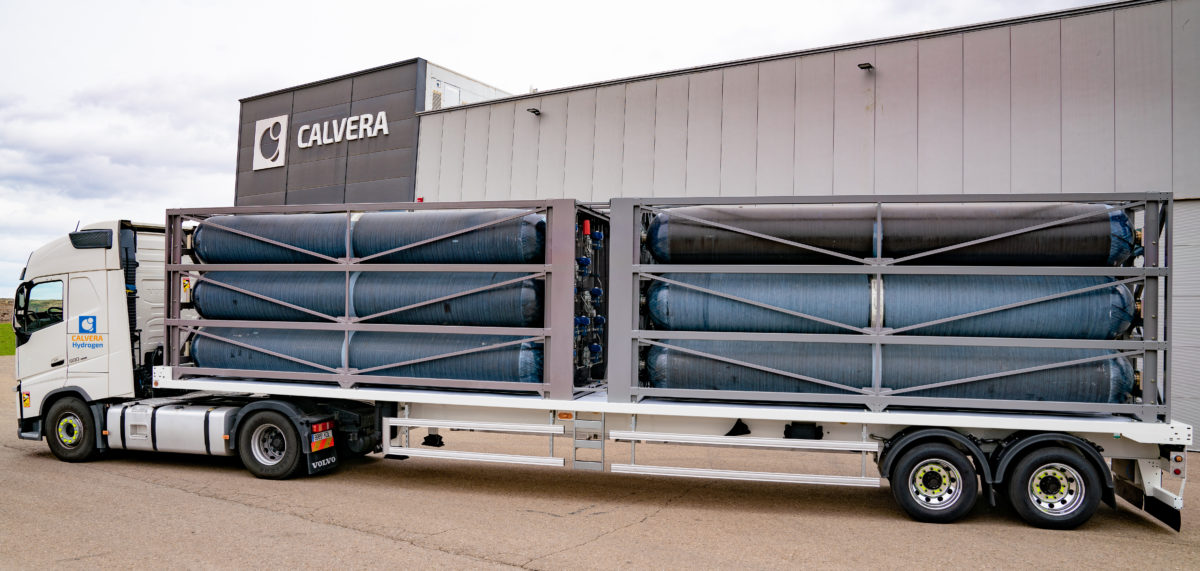Calvera Hydrogen has developed a 45-foot hydrogen tube trailer model in at its facilities in Zaragoza, Spain. It claims it has the largest capacity in the world. It developed it to service Shell's hydrogen refueling stations in North America and Europe, starting with the United States and Germany. The trailer can transport and store hydrogen.
The US Federal Aviation Administration (FAA) has granted California-based Universal Hydrogen a special airworthiness certificate in the experimental category to proceed with the first flight of its hydrogen-powered regional aircraft. The Dash 8-300 flying testbed has a megawatt-class hydrogen fuel cell powertrain installed in one of its nacelles. It will be the largest hydrogen fuel cell-powered aircraft to fly. The company expects its first model to start commercial passenger services by 2025. It said the new architecture significantly reduces weight and lifecycle costs. The fuel cells transmit all power directly to the electric motor, rather than resorting to a hybrid battery architecture.
Masdar has signed an agreement with Austrian utility Verbund to explore the production of green hydrogen for the Central European market. “The two companies will cooperate on developing pathways to produce and export green hydrogen to Central Europe, specifically Austria, and Southern Germany,” said Masdar.
The Energy Future Initiatives (EFI) said that the United States needs additional policy and regulatory actions on top of the US Inflation Reduction Act (IRA) incentives and the Bipartisan Infrastructure Law to drive hydrogen demand. “There will be a cost gap between the supply side incentives of the IRA and the conditions needed to accelerate demand in most commercial use cases, critical for market formation,” stated the team, which is led by former US Energy Secretary Ernest Moniz. EFI has proposed the development of regional hubs as market development engines, the activation of early investments for market-ready applications, the expansion of hydrogen R&D, and the prioritization of permitting and local supply chain development.
Kyushu University researchers have reported that the degradation of electrodes and membranes is accelerated by potential and temperature changes in electrolyzers. The Japanese scientists are therefore arguing for international protocols to standardize accelerated degradation tests for water electrolysis technologies powered by variable power sources. “Inputs of fluctuating currents into an electrolyzer change not only the voltage of the electrolyzer, but also its temperature and gas pressure, gas purity, and gas generation amount over time,” the team said in a recent report in the International Journal of Hydrogen Energy.
Popular content
Doosan Fuel Cell has agreed to cooperate with the South Australian government to expand its hydrogen business. The two parties have agreed to exchange equipment and expertise, while jointly establishing strategies, securing research partnerships, and building infrastructure for the supply and use of green hydrogen, according to the South Korean company.
The UK government has outlined plans for a low-carbon hydrogen certification scheme. “The government will now begin consultation with industry, with the intention of introducing the certification scheme by 2025,” it said.
Hexagon Purus has secured a €2.5 million ($2.69 million) order for mobile hydrogen refueling stations and stationary storage systems from Germany's national railway operator, Deutsche Bahn.
This content is protected by copyright and may not be reused. If you want to cooperate with us and would like to reuse some of our content, please contact: editors@pv-magazine.com.


2 comments
By submitting this form you agree to pv magazine using your data for the purposes of publishing your comment.
Your personal data will only be disclosed or otherwise transmitted to third parties for the purposes of spam filtering or if this is necessary for technical maintenance of the website. Any other transfer to third parties will not take place unless this is justified on the basis of applicable data protection regulations or if pv magazine is legally obliged to do so.
You may revoke this consent at any time with effect for the future, in which case your personal data will be deleted immediately. Otherwise, your data will be deleted if pv magazine has processed your request or the purpose of data storage is fulfilled.
Further information on data privacy can be found in our Data Protection Policy.